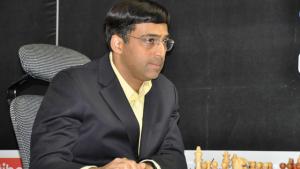
Lost and Found
The ninth world champion, Mikhail Tal wrote in his autobiography, The Life and Games of Mikhail Tal: “After an event, certain players like to indulge in an unusual form of statistics; they count up the points that stand alongside their names in the tournament table, and also those that could have been. As a rule, the number ‘lost’ is significantly higher than the number ‘found’. I cannot say this about myself.” In this way, Tal was describing his ‘luck’ in winning more games that he ought to have lost than the reverse.
Chess players tend to be a little unobjective about what games they consider ‘lost’ or ‘found’. I can remember beating myself up over some missed opportunities, completely ignoring that earlier in the tournament I had been very lucky. To do really well, you need to both win the games you ought to win, and also seize the chance when luck comes your way. Somehow your own mistakes count more than the lucky breaks you get.
In my most recent tournament, the New York State Championship, I ‘lost’ one point against GM Alex Stripunsky, by blundering badly in a better position, but I ‘found’ it in a later game against GM Sergei Kudrin. Let’s see how this went down.
On the Friday evening before the tournament my plans were still in the air. My intention had been to play in some rapid tournaments in Maryland that Saturday and Sunday. The Labor Day weekend is a big weekend for chess in the U.S., with many tournaments in various cities. However, I was considering not playing at all, since most of them were a little too small and a little too distant to make them reasonable. The Maryland rapid tournaments seemed like the best option, but there were a lot of expenses and I am not really confident in my abilities in blitz.
That evening around 9:30 an old friend from college called. He had been visiting the U.S. and was returning to Russia in a few days. “So where are you playing this weekend?” he asked. I told him I was not sure I was playing anywhere. “Oh come on, if you are not going to even play on Labor Day weekend, you might as well just quit chess. You have to at least try.” I explained that there didn’t seem to be any really good tournaments for me. Just to be sure, I looked again on the U.S. chess webpage. Suddenly I saw the New York State Championship, which I had not noticed before (it seems it was left out by accident for some time). The tournament had a $2000 first prize and seemed quite doable. A quick search showed that Albany was not as far as I thought, and there was a cheap hotel ten minutes from the tournament. I threw clothes in a bag, and within twenty minutes of seeing the advertisement was driving up I-95. I arrived around 2 AM.
These little weekend tournaments are kind of like throwing dice. Mainly because you never know who is going to show up. I could be the highest rated player, or there could be 6-7 GMs. Also, in a short tournament, the luck of the pairings makes a huge difference. This time there was GM Stripunsky, in addition to the constant tournament warriors GM Kudrin and GM Alexander Ivanov. There were also IMs Jay Bonin and Daniel Kopec.
On the first day I won two games pretty cleanly against lower rated players (a 2100 and a 2250). In the third round I drew against Ivanov. In the fourth round I played Stripunsky. My luck of the pairings was not good in this tournament – in six rounds I managed to play all three GMs, and thus I think I played the highest average of anyone in the tournament.
After seventeen moves the following position arose in my game with Stripunsky:
You might notice my backward d-pawn and ‘hole’ on d5. But did you notice my unopposed dark-squared bishop? This is the key factor. In such a position, the bishop has awesome power. White cannot – for example – use the d5 square, because then b2 would be under attack. In addition to this, the white a4 pawn is hanging out and the g3 knight is very bad, restricted by the g6 pawn. Neither player had any doubt that Black stood much better. In fact, the best Stripunsky could come up with was 18.Qc1, which protects the b2 pawn in preparation for Nd5 at some point, but also prepares a weird maneuver which I didn’t foresee.
The game continued like this:
While 20…Nxd5 really would lead to a very large advantage for Black, I still stood better. But now, with both players starting to get close to time pressure, I came up with a forcing idea that simply loses material.
Things were pretty bleak that evening. It was bizarre to go from clearly better to just losing immediately, simply by failing to calculate one move further. It seemed like the tournament was practically over. I would need 2/2 on the last day to get any kind of prize, and the odds were good that I would end up playing Kudrin anyway in the last round.
Also, another thing was bothering me.
The Scream
Early in my game with Stripunsky the silence of the tournament room was broken by a guttural shout. “Get out of here!” At first I thought someone in one of the lower sections had blundered and was expressing his disbelief. But turning around, I saw that there was an old man literally chasing a little kid. “Get away from my game! Your game is over there, you little cheater!” My guess is that the kid was watching a game of his friend, and the guy was accusing him of helping. More likely he was just venting. It was profoundly depressing.
The next morning, as I heard my alarm clock I wondered why I am doing this. Setting my alarm for 8 AM like I am going to work, except with very little chance of getting paid.
In the morning I played a teenager rated 2200. I played the opening rather poorly and therefore had to give him the choice between heading for a drawish ending and playing a full game with a slight advantage. He decided to play for the draw, but eventually I managed to grind him down in the rook ending.
Soon I realized that I had some really bad luck. Ivanov had lost with white against Stripunsky, which meant that he had too few points to play Kudrin – which meant that I would. Kudrin had half a point more than I did. There was another guy, a 2400 named Raven Sturt who had taken a bye in the last round and thus would finish with 4.5 points. This meant that I definitely needed to win – a draw would give practically nothing. Needing to win probably warped my mind a little bit, since I made a move fairly early on which wasn’t very good – even though I knew it wasn’t good.
A critical position was reached after 16 moves.
I had been regretting my 12.f4 move, but Kudrin – probably tired, and maybe feeling nervous – didn’t really exploit it. I was very happy to get in 16.e5, and I realized he was in a tough situation psychologically. He can either go into a simply worse position by trading queens or allowing the trade of dark-squared bishops, or he can sacrifice the exchange for seemingly insufficient compensation.
In some situations like this, nervousness and indecisiveness can turn into a form of carelessness, and I think this is what afflicted Kudrin here. It doesn’t mean you don’t actually care, it just means that your thinking becomes a little “loose”. In any case, he decided relatively quickly to sacrifice the exchange, and followed it up with a tactical shot. However, this simply had a refutation.
This was quite a lucky break – I am sure that in different circumstances Kudrin could make my 12.f4 look really bad, and also it is a rare event that such a strong player just blunders like that. I tied for second with Sturt (Stripunsky got clear first), and got a decent prize, which made my trip worthwhile. Okay, second place is not ideal, but I played unusually strong opposition for such a tournament. The moral of the story is, when you think you lost something, go looking in the lost and found. You might find it there!






